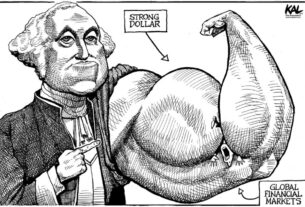LONDON — Liz Truss insisted she needed to take “decisive action,” in her first public appearance since her government’s budget threw markets into turmoil.
In a round of interviews with local BBC radio stations on Thursday morning, the U.K. prime minister refused to change course and said she had the “right plan.”
Asked whether she remained confident in her policies, Truss told the BBC: “I think we have to look at the situation we would be facing if the government hadn’t acted.”
“We are facing difficult economic times,” she said. “I don’t deny this. This is a global problem. But what is absolutely right is the U.K. government has stepped in and acted at this difficult time.”
The Bank of England stepped in with a £65 billion emergency intervention on Wednesday to stop “material risk” to the U.K. economy, buying up government bonds to try and halt a dramatic sell-off that put people’s pensions at risk.
Sterling fell to a record low against the dollar overnight on Monday in the wake of the mini-budget announced by Kwasi Kwarteng, the chancellor, last week.
Truss insisted that rising interest rates and difficult market conditions were a global problem.
“We are facing very difficult economic times. We are facing that on a global level,” she said. “We won’t see growth come through overnight. What is important is that we are putting this country on a better trajectory for the long term.”
The budget reversed a planned National Insurance and corporation tax rise, cut stamp duty which is paid for by property buyers, brought forward a 1p cut to the basic rate of income tax, and abolished the 45 per cent income tax rate for those earning over £150,000.
Asked whether it amounted to a “reverse Robin Hood” plan that would disproportionately benefit the wealthiest, Truss told the BBC: “That simply isn’t true.”
“The reality is, people having lower taxes across the board — everything from national insurance to corporation tax to income tax — helps everybody because it helps grow the economy,” Truss said.
“It’s not necessarily popular to keep corporation tax low, but I want to make sure we do because I want to make sure we attract investment into this country.”


